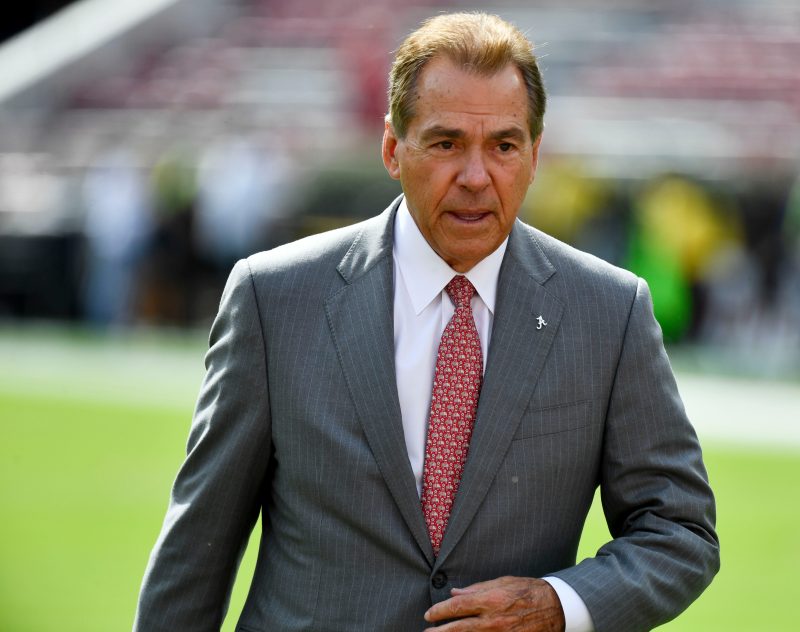The end is here.
You know, the one that was supposed to come just a few years after Nick Saban took the job in 2007? The marriage was doomed to fail, remember?
The greatest coach in modern college football history is stepping down from Alabama football’s biggest chair after 17 seasons, nine SEC championships and six national titles with the Crimson Tide.
It was never supposed to last.
Instead, it’s a legacy that will last.
It’s hard to blame those who never thought Saban would stick around at Alabama. After all, the school has never been known for patience with head coaches, and churned through four of them in 10 years before Saban’s arrival. Pairing that backdrop with a coach with a reputation for quick fixes and quick exits – Saban had never previously coached anywhere longer than five years – certainly seemed chemically unstable at the time.
WHAT’S NEXT: Five candidates Alabama should consider to replace Nick Saban
Behind the public perception, however, crucial elements to the Alabama-Saban union instead created a bonding effect. After the 2006 season, ahead of late athletic director Mal Moore’s landmark hire, the Crimson Tide was a resource-rich program desperate for a winner. It was also a school ready and willing to back the right man for the job with unprecedented administrative support. Saban wouldn’t have accepted anything less, and fortunately for Alabama, its courting of the coach was impeccably timed just as Saban, after two seasons with the Miami Dolphins, was realizing the college game was his true calling.
A volatile mix? No, as it turned out. Just a victorious one.
Saban dove head-first into college football’s hottest coaching cauldron, and cooled it almost instantly. Winning 12 games in your second year will do that, but if the 2008 turnaround was a surprise, the fact that the coach planted roots is what shocked. With Alabama doing whatever it could to extend Saban’s success, including contract extensions that regularly made him the game’s highest-paid coach, he settled in like he’d never done anywhere else.
The signs that Saban was ready to call it a career, in retrospect, hid in plain view.
From the $17 million home he bought on Jupiter Island (Florida) last offseason – even for college football’s most well-compensated coach, that’s a lot for a summer home – to the way he seemed to soak in the moment as his final Alabama team matured and won and bonded and fought, the hints were there.
Saban won more than 200 games at Alabama and leaves behind all sorts of fun facts that illustrate the Crimson Tide’s dominance during his time at the Capstone.
Among his record seven national championships, he won six at Alabama, which tied Crimson Tide legend Paul W. ‘Bear’ Bryant for the most by one coach at the same school. His teams were ranked in the top 10 of the AP poll for 128 consecutive weeks from 2015-2023, the second-longest streak in the history of the poll. There was a 15-year win streak over rival Tennessee, longest in series history, and five consecutive trips to the College Football Playoff, beginning with its inception. First-round NFL draft picks were produced by the bushel, including a record-tying six in a single draft (2021).
But the most impressive of them all is that every player he signed from 2007 through 2020 who stayed in the program for at least three years has at least one national championship ring. Across those 14 signing classes, there wasn’t a more powerful recruiting tool than that; as close to a guarantee of national-title glory as there was in the sport.
The result was a wave of signing classes ranked No. 1 or No. 2 in the nation that entered Saban’s elite developmental program, then came off that conveyor belt NFL-ready at a stunningly high rate.In sum, it was a coaching run that stands alone in the modern era, and will always draw comparisons to Bryant’s. Just as Bryant’s retirement was a watershed moment for Alabama football, so too is this moment. As Bryant left behind a void that nobody could hope to fill, so too has Saban. He leaves behind a program in so much better shape than he found it, the job has gone from one that top coaches were leery of to one that they would flock to.
And it was never supposed to last.
Tuscaloosa News columnist Chase Goodbread is also the weekly co-host of Crimson Cover TV on WVUA-23 and the Talkin’ Tide podcast. Reach him at cgoodbread@gannett.com. Follow on Twitter @chasegoodbread.

